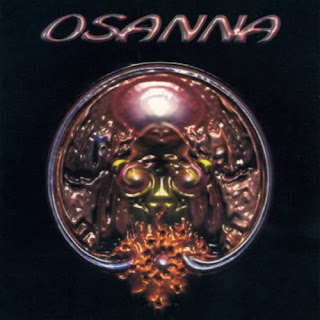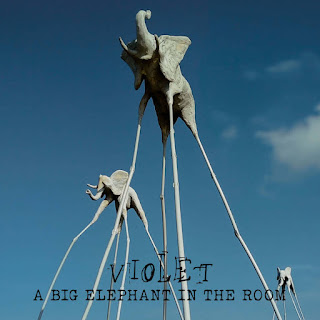In 1999, after a hiatus of more than twenty years, founder members Lino Vairetti and Danilo Rustici decided to bring back to life the music of Osanna re-arranging the old repertoire of the band for some new live performances. In 2001 Osanna released a new studio album, entitled Taka Boom, on their own independent label Afrakà with a new line up featuring Lino Vairetti (vocals, guitar), Danilo Rustici (electric and acoustic guitar) and Enzo Petrone (bass) with Gennaro Barba (drums), Gigi Borgogno (electric guitar), Vito Ranucci (sax) and Luca Urciuolo (keyboards) plus the special guest Enzo Avitabile (vocals). It contains some new arrangements of pieces from the seventies Osanna’s albums and two brand new tracks...

“L’uomo” opens the album with a surge of energy. This new version of Osanna’s debut album opener is brilliant, more aggressive than the original one and with an almost rapped section emphasizing the lyrics. The following “Ce vulesse ce vulesse”, is a piece from Suddance (“Ce vulesse”) that here is revitalized with the addition of a second part (“Canta chiù fforte”), harder and angrier than the original one...
The dreamy “Medley acustico” bounds a short excerpt from Palepoli, “Oro caldo”, with “My Mind Flies” from Preludio, tema, variazioni e canzona and “L’amore vincerà di nuovo” from L’uomo. The effect is interesting, but you can’t really resume and condensate such pieces in just five minutes and I feel that something is missing here...
The ironic, funny “Taka Boom” is a new track dealing with the risks of internet addiction leading to a virtual life disconnected with reality. On line you can find everything, you can burn every book and every film because you don’t need them any more, even sex can be experienced on line and pleasure stored in a file... Until the body of your virtual partner, hacked by viruses, will blow up!
Next comes another medley, “In un vecchio cieco - Vado verso una meta”, with two pieces from L’uomo that were bound also on the 1971 album (although in a different order) and here are in some way simplified and played in a more straightforward way. Then the canzona from the second album in its new dress, “There Will Be Time”, leads to “Medley Train” where a piece from L’uomo, “Mirror Train”, is enhanced with a new middle section featuring rap style vocals in the dialect of Naples, “Treno senza stazione” (Train without station).
The new versions of “’A zingara” (from Suddance), “Oro caldo (Fuje ‘a chistu paese)” (an excerpt from Palepoli) and “Everybody’s Gonna See You Die” (from L’uomo) follow and lead to another new track “Colpi di tosse”, a song “of rage and nostalgia” featuring the narrative and rap vocals of the guest Enzo Avitabile interacting with Lino Vairetti’s melodic lines and including quotes of “Fog In My Mind”, from Landscape Of Life. A short acoustic version of “L’uomo” ends the album.
On the whole, a good work that takes Osanna into the new millennium but not an essential one.
*******************
Uomini e miti is in part a celebration of one of the most relevant bands of the Italian progressive scene of the Seventies and in part a new starting point... Perhaps the magic is gone, but Osanna show here that they are still able of great live performances and the new line up deserves credit. The album was released in 2003 on the independent label Afrakà and contains a CD and a DVD

The CD features six live tracks full of energy and enthusiasm where the band play the updated versions of some historic pieces and the result is quite good... “Ce vulesse - Ce vulesse”, “’A zingara”, “L’uomo”, “There Will Be Time”, “Mirror Train” and an excerpt from “Oro caldo” reflect the new arrangements from their previous album Taka Boom and flow without breaks for more than half an hour.
Then there are some tracks recorded in the studio. “Medley acustico: Oro caldo / My Mind Flies / L'amore vincerà di nuovo”, “Colpi di tosse” and “Taka Boom” come from Osanna’s previous album Taka Boom while “Non sei vissuto mai”, a new arrangement of a piece from 1971 album L’uomo, was previously unreleased.

The DVD documents a celebration concert for the 30th anniversary of the band (recorded in Naples in December 2001), featuring the performances of some guest stars such as Francesco Di Giacomo and Rodolfo Maltese (BMS), Vittorio De Scalzi (New Trolls), Paolo Fariselli (Area), Gianni Leone (Il Balletto di Bronzo) and Jenny Sorrenti (Saint Just) and one track from another concert in 2003. The quality is good and it could be of some interest for Italianprog lovers...
On the whole, a good work.



























